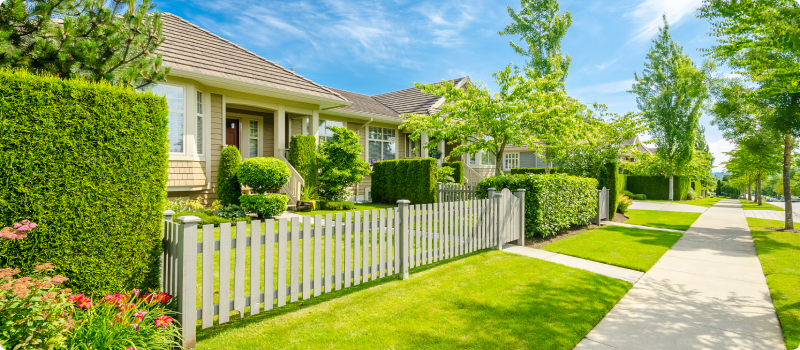How to Be a Good Neighbor
Updated May 14, 2024 . AmFam Team
Being a property owner brings a sense of liberation — you can do with your humble abode as you wish. But, with that sense of freedom comes responsibility. And we don’t just mean paying the mortgage or keeping your home clean. It’s about being a respectful, civil neighbor to those who live around you.
Having neighborly etiquette is key to maintaining a positive relationship with those in your neighborhood — and this can highly impact your quality of life. Take a look at our eight tips on how to be a good neighbor.
Offer More than a Welcome Basket
Is there someone new to the neighborhood? While a welcome basket is always a nice gesture, take it a step further and include a “need-to-know” checklist. This can include things like what day the trash is picked up, suggestions on where the nearest grocery stores, restaurants, parks and other key attractions are located. Include business cards and sample products to your favorite local businesses and provide the contact info of a great babysitter in the neighborhood or a handyman who everyone relies on. Deliver the welcome basket in person and let them know they can come to you with any questions.
Maintain Your Curb Appeal
Did you know that even one unkempt home in a community can reduce the property value for the whole neighborhood? Don’t be the house on the block known for overgrown grass and dead flower beds. Keep the curb appeal of your home looking its best by regularly mowing your yard, cleaning out your gutters, power washing your home and picking up the toys scattered on the lawn.
Be a Mindful Pet Owner
You may love your pet and everything they do — but that doesn’t mean everyone else does, too. A good neighbor is a responsible pet owner who keeps their pets in check. Taking your dog for a walk throughout the neighborhood is a great way to meet people, but make sure to keep them on a leash, clean up their messes and deposit the bags in your own trash can — not your neighbors. Also, whether out for a walk or at home, do what you can to keep your dog’s barking to a minimum. Your neighbors will appreciate it.

Know Your Property Lines
A property line is a boundary that defines where your land ends and your neighbor’s land begins. Avoid property line disputes with your neighbors by knowing where they exist. You can find where your property lines are located by hiring a surveyor, checking your property deed or reviewing a plat map, which you can usually find through your local assessor’s office or planning office.
Fence Etiquette
Are you planning on putting up a fence in your yard? Follow fence etiquette. Talk with your neighbor — in person — about your plans. Let them know the type of fence you’re putting up and whether or not you’ll be sharing costs. If you do plan to share costs, make sure you discuss who will have the finished side, which is the side with fence boards covering the fence posts. This is a prime scenario where knowing your property lines comes in handy, since you’ll need to know where the boundaries exist before putting up the fence.
Follow Community Rules
Do you live in a homeowners or condo association? If so, you likely agreed to follow a set of community rules. Take the time to review your association’s rules, like parking restrictions, lawn maintenance and quiet hours. Whether or not you belong to a homeowners or condo association, it’s important you’re following city ordinances. It’s a simple way to avoid conflict and keep the peace with your neighbors.
Keep the Noise Down
If you live in a place with shared walls, like a duplex, be especially mindful of the noise you create. Planning a party that’ll go late into the night? Let your neighbor know about it. Doing your laundry in the evening? Consider switching to an earlier part of the day so your neighbors aren’t kept up by the clothes tumbling in your dryer. Noises you may not think about, like the exhaust fan in your bathroom, can actually be a nuisance to your neighbors.
Shared walls or not, be a respectful neighbor by adjusting your noise levels so they’re appropriate for the time of day.
Handle Conflict Peacefully
If there comes a time where there’s an issue, handling conflict in a peaceful manner is crucial to maintaining a good relationship with neighbors. Your best bet is to meet face to face and discuss the issue in person — it’s easy for messages to get misinterpreted when trying to resolve through text or email. And that can make a simple problem become a bigger one.
One of the best things you can do to be a good neighbor? Think about how you’d like to be treated. Being respectful, kind and extending a helping hand to those who live around you go a long way. Get involved with your neighborhood by attending block parties and other events going on — it’s a great way to meet your neighbors, get on good terms and maybe even form lasting friendships.
This article is for informational purposes only and based on information that is widely available. We do not make any guarantees or promise any results based on this information.

